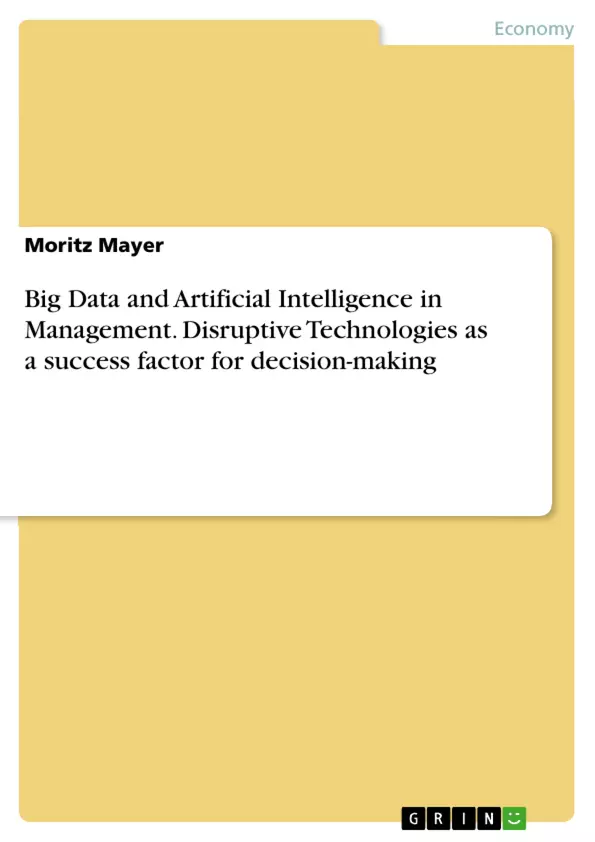Geopolitically, economically and technologically, the world is in a state of upheaval. Technological progress is shortening innovation cycles, processes and projects in companies are steadily gaining in complexity, and the globalized economy is producing increasingly dynamic markets. In an era characterized by the networking of the real and virtual worlds, data is emerging as the resource of the future. However, the huge amounts of data, also known as Big Data, demand that they be used effectively.
As a result, management must make increasingly frequent and complex decisions. However, human working time is scarce and the question arises as to whether human capacity, intelligence and creativity can still cope with the increasing demands.
Could AI, using Big Data, possibly act as a success factor, in corporate decision making?
Under this question, Mayer compares the decision-making of a human with that of an artificial intelligence. The focus here is primarily on the economic goal idea. What basic requirements does an AI need? What risks open up, among other things in terms of loss of control, ethics or data protection? And to what extent are the numerous visions actually realizable in practice?
From the contents:
- Digitization
- Big Data
- Artificial Intelligence
- Management 4.0
- Enterprise
Inhaltsverzeichnis (Table of Contents)
- Foreword
- List of abbreviations
- 1 Introduction
- 2 Basics
- 2.1 Current economic environment of German companies
- 2.2 Information and data
- 2.3 Digitization and Big Data
- 2.4 Artificial Intelligence
- 2.5 Other relevant aspects
- 2.6 Entrepreneurial Management 4.0
- 3 Analysis of decision-making in management
- 3.1 Key decision-making functions of management
- 3.2 Key factors in decision-making
- 3.3 Human decision-maker versus artificial intelligence
- 3.4 Decision-making insights
- 4 Analysis of the feasibility of artificial intelligence in practice
- 4.1 Basic needs
- 4.2 Risks
- 4.3 Insights into feasibility
- 5 Concluding remarks
- Bibliography
Zielsetzung und Themenschwerpunkte (Objectives and Key Themes)
This work aims to provide a scientifically sound analysis of the role of artificial intelligence in management decision-making. It explores the current economic environment, the concept of big data, and the potential of AI as a disruptive technology. The text analyzes the feasibility and implications of AI in practical business applications. The key themes of this work include:- The impact of digitization and big data on business operations
- The role of artificial intelligence in management decision-making
- The potential benefits and risks associated with AI implementation
- The practical feasibility of AI in various business contexts
- The impact of AI on the traditional role of human decision-makers
Zusammenfassung der Kapitel (Chapter Summaries)
The first chapter provides an introduction to the topic of big data and artificial intelligence in management, highlighting their relevance and importance in the modern business world. The second chapter delves into the basics of big data and artificial intelligence, exploring their definitions, applications, and potential impact on various industries. It examines the current economic environment of German companies and explores the role of information and data in decision-making. The third chapter focuses on the analysis of decision-making in management, examining key decision-making functions, factors influencing decision-making, and the potential role of artificial intelligence. It compares the capabilities of human decision-makers with those of AI systems. The fourth chapter delves into the practical feasibility of artificial intelligence, examining the basic needs, risks, and insights into its implementation.Schlüsselwörter (Keywords)
The primary focus of this work is on the application of big data and artificial intelligence in business management. Key terms and concepts include: digitization, big data, AI, decision-making, feasibility, risk, benefits, business operations, and human decision-makers.Frequently Asked Questions
How does AI contribute to corporate decision-making?
AI can process vast amounts of "Big Data" to provide insights, predict trends, and support managers in making complex decisions more effectively.
What is "Management 4.0"?
It refers to the transformation of leadership and organizational processes in the era of digitization, where virtual and real worlds are networked.
Can AI replace human managers?
The thesis compares human decision-making (intelligence and creativity) with AI, discussing whether AI acts as a success factor or a complete replacement.
What are the risks of using AI in management?
Key risks include loss of control, ethical concerns, data protection issues, and the potential lack of transparency in algorithmic choices.
Is AI feasibility in practice fully realized?
The work analyzes to what extent current technological visions are actually realizable in the daily operations of German companies.
- Quote paper
- Moritz Mayer (Author), 2019, Big Data and Artificial Intelligence in Management. Disruptive Technologies as a success factor for decision-making, Munich, GRIN Verlag, https://www.grin.com/document/1196426



